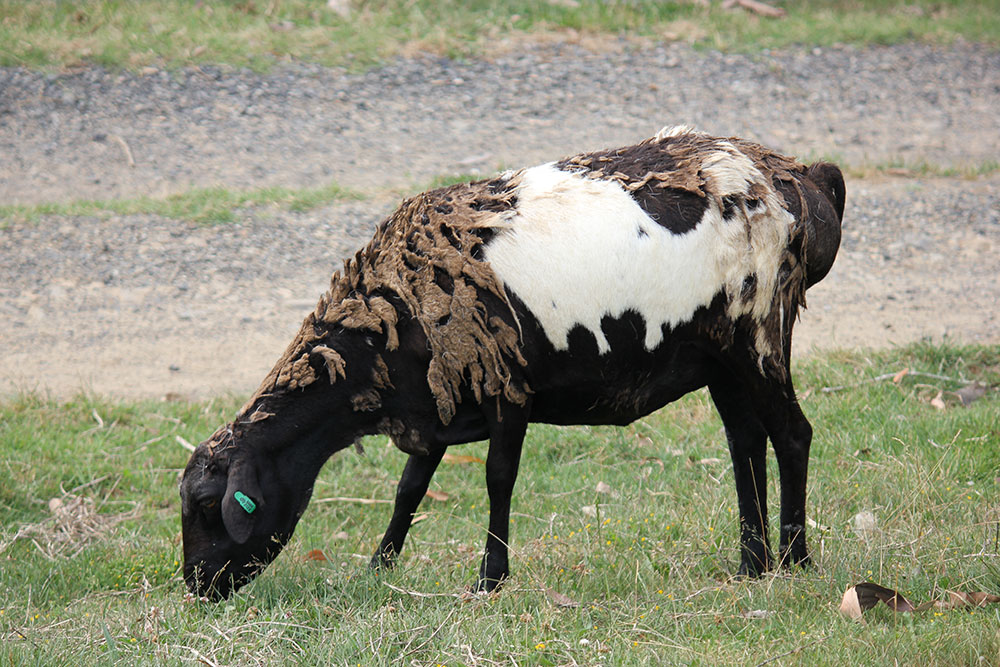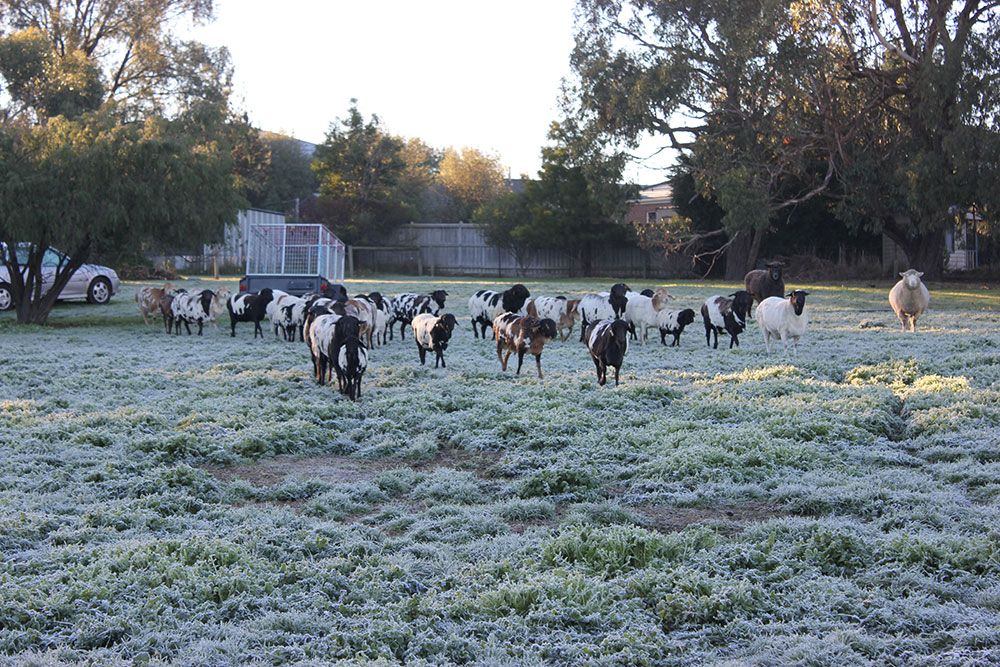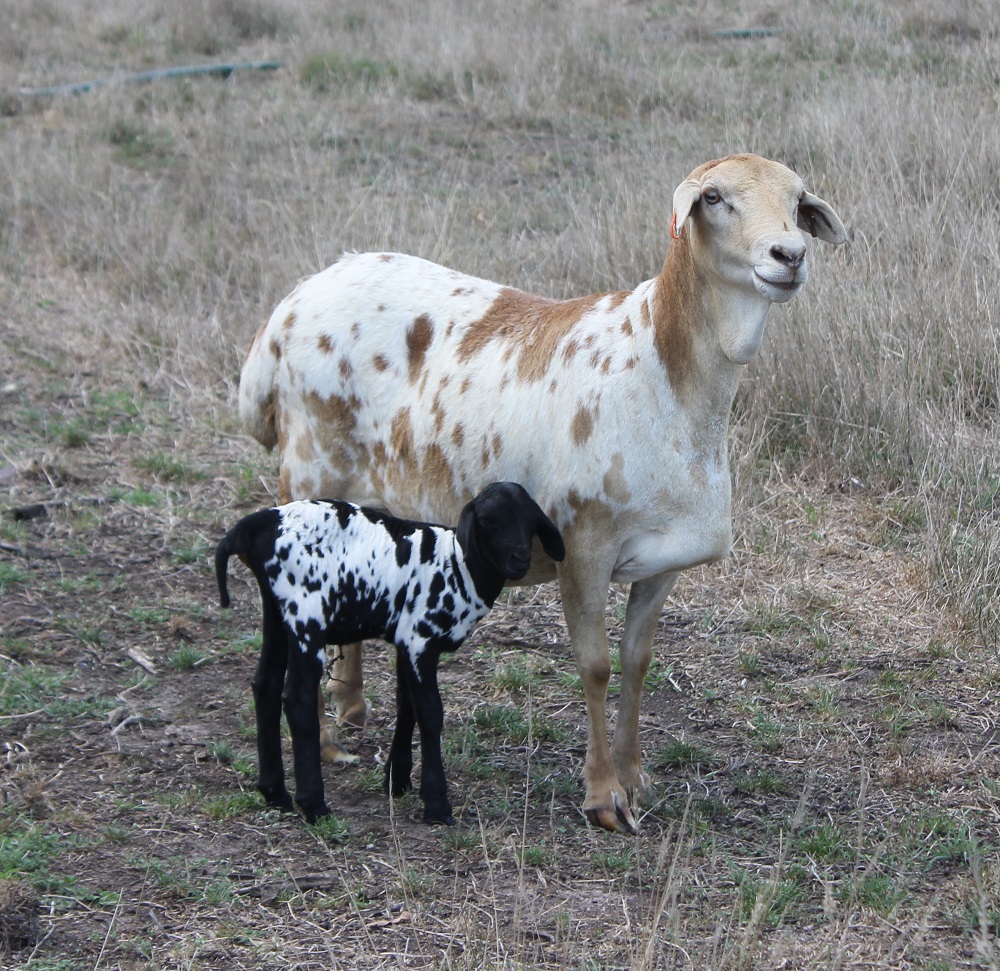- Home
- Persian Sheep
- Persian Sheep Management
Persian Sheep Management
Persian sheep have the big advantage that they do not need shearing. This is particular significant as shearing costs continue to rise and wool prices fall. In addition, because they have a self-shedding short coat they do not experience any of the health problems associated with the thick woolly fleece of other breeds. They do not get flystruck and are less vulnerable to fleece rot and heat sensitive external parasites like lice. Not having a fleece also means they can tolerate hot, dry conditions more easily. They are not crutched or mulesed. Their tails are not docked.

‘Genelink Domino’ photographed in January shedding her coat
Persians need a complete and balanced diet but having developed originally as a desert sheep surviving on low nutritional value food, and also not having to grow a fleece, means that they havean overall lower calorie requirement than breeds with wool. They have a strong thick skin and a long breeding season, as well as their short coat. These characteristics all helpin an arid situation. These days, however, Persians are found in a range of climatic and grazing conditions including the arid areas of South Australia and the tropical regions of Queensland but also do just as well in the high rainfall southern states. They do, however, require adequate shelter during extremely cold periods, particularly if protracted.

Persian sheep at Coolibah in Melbourne in July on a frosty morning
Most Persians are maintained on grass pastures. Like all sheep they benefit from nutritional support during times when available pasture is reduced. Lucerne hay and grain supplements such as ‘Stud Sheep Blend ‘ made by Laucke are useful in maintaining condition. To keep the animals at their best a mineral supplement such as “Weather Shield Sheep “ made by Propharmashould be provided. Persians are however natural foragers. They are able to graze and browse which means they will consume plants seldom eaten by many of the woolly breeds. Grain hays such as wheaten or oaten hay are useful supplements and encourage rumination. They are also enjoyed by the sheep.
Persians love oaten hay
Lambs have low birth weights which makes for easy lambing. Approximately every fourth lambing results in twins.
Like some other breeds Persians do have a genetic predisposition to ‘shelley toe’, particularly if kept on wet, soft ground for extended periods. In this condition, the outer horn of the foot separates from the underlying soft tissue. This leads to impaction of material in the space created and pain. Affected sheep are noticed to be lame in the paddock. The condition is treated by trimming away the excess horn with paring clippers. Once trimmed, affected sheep are usually walking normally within 2 – 4 days.
Like all sheep, Persians need to have effective worm control measures in place which include pasture rotation and worming treatments at appropriate times. They should also receive a ‘5 in 1’ vaccination against the Clostridial diseases twice in the first year of life, and then have annual boosters. Owners should establish a good relationship with their closest sheep veterinarian who will not only be able to help with any primary health problems that crop up but also advise on particular pasture or health issues that apply locally.
Dr Jack Nicolas of South Cranbourne Veterinary Surgery performing an emergency caesarean on Stud Sheep Genelink Champagne

Genelink Champagne in February 2015, nine months later and fully recovered after her caesarean with her new lamb, a black speckle ewe.
Summer 2014
Persians relish oaten hay and feeding it encourages remunation and good digestion.
Dr James Walker and Dr Isabel Taylor from the University of Melbourne perform a routine health check on some Coolibah ewes prior to mating, Autumn 2015.
